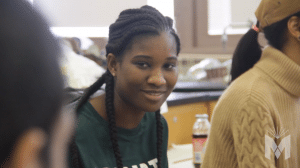Catalyzing Equity Through Culturally Responsive Education and Competency-Based Education
CompetencyWorks Blog
 Right now race has enormous cultural, social, and economic power. It can shape our families and communities, career trajectories, life experiences and opportunities, and even whether we live past thirty or not. So our job in the field of education is to identify each and every place where race is making a difference in children’s lives because of either systemic policies and patterns or because of implicit and explicit bias. It starts with ensuring that our schools have a culture of belonging. As Joy Nolan from the Mastery Collaborative emphasizes, Every student should walk into school feeling like their school is for them, designed for them, serving them, and for people “like them.”
Right now race has enormous cultural, social, and economic power. It can shape our families and communities, career trajectories, life experiences and opportunities, and even whether we live past thirty or not. So our job in the field of education is to identify each and every place where race is making a difference in children’s lives because of either systemic policies and patterns or because of implicit and explicit bias. It starts with ensuring that our schools have a culture of belonging. As Joy Nolan from the Mastery Collaborative emphasizes, Every student should walk into school feeling like their school is for them, designed for them, serving them, and for people “like them.”
The team at Mastery Collaborative in NYC have identified that the practices of culturally responsive education go hand-in-hand with the mastery-based learning practices. They have created a very simple resource (see below or click here) to allow educators or, better yet, teams of educators (it is very hard to identify implicit bias if it is just a conversation between you and yourself – you need trusted colleagues to help you see where you might have blinders or filters that are creating trouble) to think about their facilitation, curriculum, and grading practices.
Mastery Collaborative Resources on Culturally Responsive Education
Infusing CRE into Mastery Practices
How Can Mastery Learning be More Culturally Responsive (video)
The more I learn about culturally responsive education, the more I think it is important that the leaders in the world of personalized learning do the crosswalk as well. There are so many practices that are valuable in culturally responsive education that are either the same or similar enough to make personalized learning become a catalyst for racial equity. But that won’t happen unless there is the intention of doing so. Without intention to change, we end up perpetuating inequality.
Do you have tools, resources, or strategies that are helping you and your school to strengthen your culture and practices so that you are truly an equitable school where every student is going to succeed regardless of race? Or a story about how competency-based education and its focus on continuous improvement is helping your school or district improve educational services and outcomes for historically underserved students? Please share. As a community, I am confident that we can not only commit to equity. We can make a difference in children’s lives for the better.
– – –
Infusing CRE/Mastery practices into our work with young learners
Exploration
- Please check indicators you feel are your strengths. ✔
- Use a question mark where you want more information. ?
- Draw a star to show a possible focus/growth area for you. *
I can point to evidence that shows that . . .
- All students in my/our classroom feel they are welcomed, they belong here, and
that their learning has value. facilitation
-
- My/our learning goals focus on skills/ knowledge that will be valuable to students’ postsecondary life—not just what’s on the Regents, etc. curriculum
- I/we embrace a strength-based perspective—our students are capable of significant growth and accomplishments. facilitation
- Students progress by mastering the stated learning goals. I/we do not grade based on class participation/behavior—instead, I/we name, teach, and coach students on particular skills. grading
- Students are able to move at own pace to gain needed skills and knowledge. Flexible pacing is not just “okay,” but is the norm. curriculum, facilitation
- Students have multiple opportunities to build and demonstrate mastery. I do not give extra credit, but retake opportunities are frequent. facilitation, grading
- All students’ racial/social identities are welcomed, respected, valued, and normed in the classroom. Facilitation
- Meaningful and varied opportunities for active roles, voice, and choice empower learners to shape their educational experiences. curriculum, facilitation
I can point to evidence that shows that . . .
- I/we communicate clear and fair criteria for success from the start. Grading practices are transparent to all. Opportunities for subjective judgments/biases are pushed aside. grading
- I/we use backward planning to create a system for transferring skills and knowledge. curriculum
- I/we invite and seek ways to respond to students’ cultures, experiences, interests, and learning styles as an important dimension of learning and context for learning. facilitation
- I/we build strong relationships with students, and regularly read and adjust to the emotional “weather” in the classroom. facilitation
- My/our students get timely, focused feedback, based on the stated learning goals for the unit. curriculum, facilitation
- I/we use grades to support learning, not to sort students. grading
- I/we use restorative practices for resolving social issues, in a community of mutual respect.
- I/we don’t use grades to reward or punish behavior. facilitation, grading
- Learning experiences are developed through a lens of racial justice, social justice, and equity. Eurocentric/dominant perspectives (“The Canon,” studying white/male scientists and mathematicians/European History to the exclusion of others, etc.) are balanced and
critiqued by other perspectives. curriculum
See also: